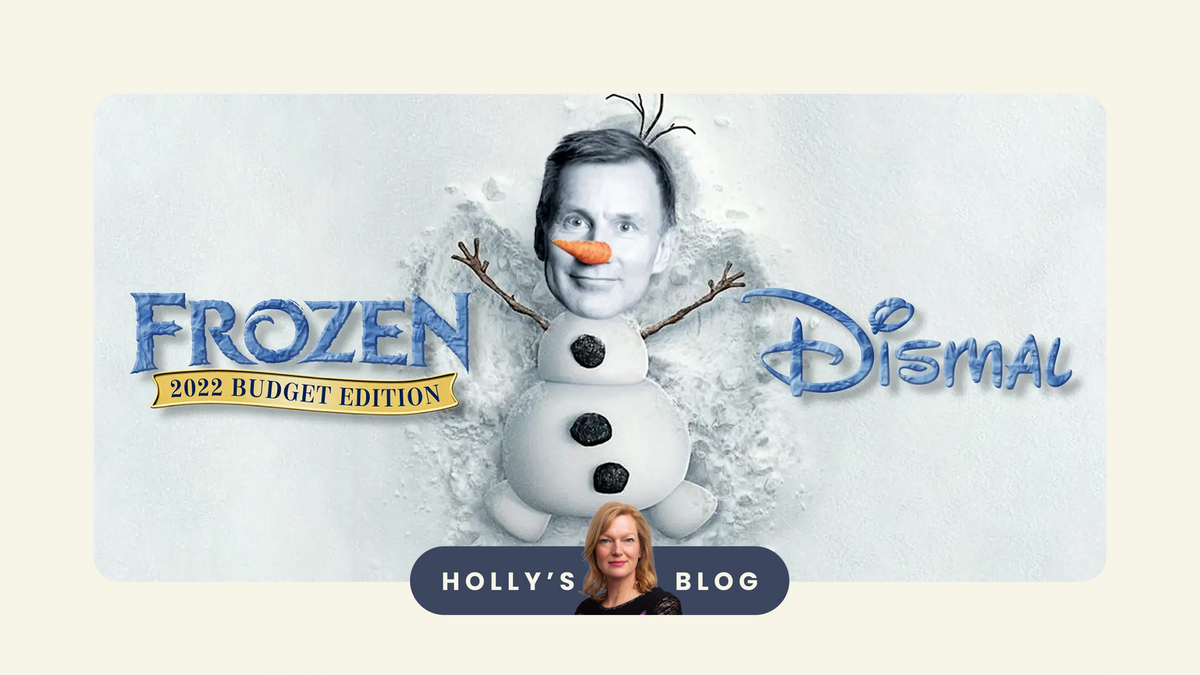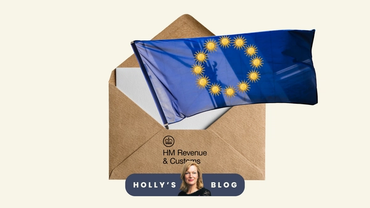Frozen - A Dismal production
18 Nov, 2022

Yesterday’s Budget was pretty gloomy as the Chancellor extended the freeze on many tax thresholds. This may not painful feel too bad today but it’s a bit like having another glass of warm white wine at a Christmas party. We do it, and it’s not too bad right now, but we know we’re going to have a horrible headache tomorrow.
No surprises with the big picture macro stuff. Mr Hunt declared the Recession now officially open. Unemployment is forecast to rise to 4.9% in 2024 – that’s another half a million people out of work. And both living standards and house prices are forecast to fall. “Let it go, let it go, can’t hold it back anymore…” hummed Rishi nervously.
Income tax hangovers
That dreaded highest rate of 45% will now apply to every £ earned over £125,140. Not £150,000. That’s another 200,000 people pulled into the highest band now – but with more to follow in coming years as wages go up but thresholds are frozen.
Any reader in the band between £100,000 and £125,140 – here’s something to make you feel sick 🤢. Income in this band is effectively taxed at 60% because you lose £1 of your nice tax-free personal allowance for every £2 you earn over £100,000. As well as paying 40% tax. If you hover just below £100,000, it’s worth reading up on how things like pension contributions can keep you under the £100,000 of income bracket.
With pretty much all thresholds frozen until 2028, the reality is that the vast majority of us will pay a lot more tax in years to come. Not much we can do about this but it does arguably make pension contributions more appealing – and now even more appealing for higher earners on over £125k a year who will get more tax relief.
House purchasers
Stamp duty cuts are now only held until 2025. At which time the nil rate threshold will be cut from £250,000 back to £125,000. And the nil rate threshold for first-time buyers will fall from £425,000 to £300,000.
So. Do you buy now? At a time when prices are forecast to fall about 10% over the next two years? But if you wait too long, you’ll get hit with higher Stamp Duty.
The better news on mortgages is that a forecast for inflation to fall significantly mid-year also suggests interest rates will fall then too. Although fixed rate deals of 1% - 2% won’t be seen on the shelves for quite a long time to come, there will be much better rates available for fixes mid next year (I think!).
On this, I make a quick aside. It is very British to be brought up to think that life is a race to pay off your mortgage. Marry a toff. Eat your crusts. Stand in queues. And pay off your mortgage. Well, not so fast! Crusts are vile. And if your mortgage is currently on a fix of, say, 1.5%, and easy access accounts are paying 2.5% - what on earth are you doing?!
The cold never bothered me anyway…
Well, it does me and I reluctantly put the heating on for a few hours this week. How profligate. The current energy price guarantee scheme will continue from April, but the average household bill will now rise to £3,000from £2,500. Please note that these are averages, not maximum caps, so your bills will be in line with usage.
There will be additional lump sum support payments next year - £900 for those on means tested benefit, £300 for pensioners, and £150 for those with a disability.
Investors
DIY investors were clobbered yesterday. Capital Gains Tax allowances will fall from £12,500 to £6,000 next year. Then £3,000 the year after. This will hurt those who have investments outside ISAs or pensions, or a second property, when they come to sell them. Remember that CGT is charged at 28% on residential property for higher-rate taxpayers, and 18% for basic rate taxpayers.
Also renters - N.B. Landlords will be feeling very grumpy. Paying more tax on the eventual sale of any property is just the latest thing to make being a landlord less appealing. They will want more money to make the hassle worthwhile. Rents are almost inevitably going to rise. Be prepared for the call.
Dividend allowances also fall. The allowance will be cut from £2,000 to £1,000 in April next year, and then reduced down to £500 from April 2024. To put this into context, for a higher rate taxpayer, an income portfolio generating at least £2000 dividends will lose over £300 a year.
What can you do about it? Use your ISA allowance. If you don’t have spare cash but have some investments outside an ISA, read up on the oddly called ‘Bed and ISA’ (i.e. shoving investments into a tax-free wrapper, using your annual allowance this way to build up more money in tax-free pots). Consider raiding the kids’ Junior ISA allowances – that’s a £9k a year allowance per rug rat. And use pensions.
Inheritance tax
This is insidious. Think about inflation and how much house prices have gone up recently. And then think about this threshold being frozen at £325,000 until 2028. If you give your home to your children or grandchildren, this increases to £500,000. More and more people will be dragged into this most hated of taxes.
What can you do about it? Read more. Make a will. Make sure you have a plan. Get some ad hoc financial advice on this and ask to pay a fixed fee. Charles Stanley, for example, offer fixed fee planning packages costing £900 to help people make a plan for IHT. And talk about gifting – any gifts made 7 years or more before passing away are exempt.
Every year you can give up to £3,000 away tax-free. This is known as the ‘annual exemption’. If you didn’t use it last year, you can combine it and pass on £6,000. You can also make a wedding gift of up to £5,000 to your child; up to £2,500 to your grandchild; up to £2,500 to your spouse or civil partner to be; and £1,000 to anyone else.
“Anna, you can’t marry a man you just met!”
“Oh, shut up, Elsa, yes I can. I’m saving on inheritance tax.”
Oil-sa
Shares in BP and Shell were trading very marginally lower yesterday after the Chancellor unveiled a bigger-than-expected increase to the windfall tax from 25% to 35%. Schnookums. They seem OK again today.
Pensions and benefits
Both the State Pension and means-tested benefits, including Universal Credit, will rise in line with September’s inflation figure of 10.1% from next April.
Phew! So there you have it. A Budget which placated financial markets, who saw the workings and so kept their cool. And which confirmed a tough outlook for us all, but with most of the pain to be felt tomorrow as those frozen thresholds start to bite. Let the storm rage on.
Have a great weekend everyone. I am not holding my breath for gambling riches next week – I got Serbia in the Boring Money World Cup sweepstake. Bah.
Holly
P.S. I’ll be confirming the launch of our new Sustainable Investor quiz next week – to help guide you to some well-rated funds which will map to your preferences. Those who fancy a sneak preview, have a look here...












